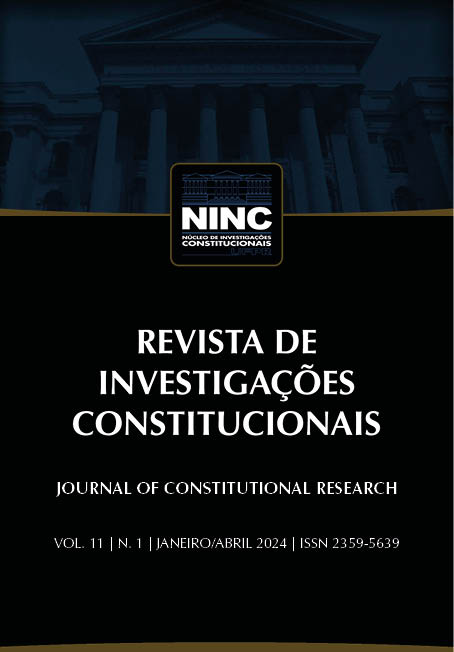Legal Framework for Protecting the Right to Private Life in the Digital Space: The Extent to which Jordanian Constitution and legislation Takes into Account International Requirements
DOI:
https://doi.org/10.5380/rinc.v11i1.90631Palavras-chave:
private life, digital space, digital privacy, personal data, Jordania.Resumo
The article analyzes the legal framework for protecting the right to private life in the digital space and strengthening the constitutional rights stipulated in the Jordanian Constitution, by regulating the right to private life in the digital space, protecting personal data in light of the ease of collecting, retaining and processing it, and preventing infringement on the right of citizens to protect their personal data and privacy as stipulated in the Jordanian Constitution and relevant legislation. The article aims to find a legal framework that balances the rights of citizens to protect their personal data, and allowing data and information to be processed and preserved in the digital space, as well as the extent to which the Jordanian legislator takes into account international requirements regarding the protection of the right to private life in the digital environment. The study reached several conclusions and recommendations, the most important of which is the need to develop legal legislation to regulate the mechanism of saving and processing personal data within clear restrictions and obligations. In addition, it is necessary to develop legislation to ensure the safety of digital space and support its stability, and define the obligations imposed on those responsible for personal data, as well as the punishments and penalties imposed on persons who violate the legislation that regulate the right to privacy, taking into account international requirements.
Referências
AL-BILLEH, Tareq. Freedom of Religious Belief and the Practice of Religious Rites According to the Jordanian Legislation: Difficult Balance Between International and Regional Requirements as well as the National Legislative Controls. Balkan Social Science Review, Stip, R. N. Macedonia, vol. 20, n. 1, p. 117-137, 2022. Available at https://js.ugd.edu.mk/index.php/BSSR/article/view/5503/4660
AL-BILLEH, Tareq. Legal Controls of the Crime of Publishing a Program on the Internet in Jordanian Legislation. Pakistan Journal of Criminology, Khyber Pakhtunkhwa, vol. 14, n. 1, p. 1-14, 2022. Available at http://www.pjcriminology.com/wp-content/uploads/2022/08/1.-Legal-Controls-of-the-Crime-of-Publishing-a-Program-on-the-Internet-in-Jordanian-Legislation.pdf
AL-FAQIH, Souad. Criminal Protection for Private Life in Libyan Law, a Comparative Study. Egypt: Dar Al-Alam Al-Arabi, 2017.
AL-FATLAWI, Suhail. Al-Wajeez in the principles of contemporary human rights. Amman: Dar Al-Badil for Publishing and Distribution, 2023.
AL-KHAWAJAH, Noor; AL-BILLEH, Tareq; MANASRA, Majd. Digital Forensic Challenges in Jordanian Cybercrime Law. Pakistan Journal of Criminology, Khyber Pakhtunkhwa, vol. 15, n. 3, p. 29-44, 2023. Available at https://www.pjcriminology.com/publications/digital-forensic-challenges-in-jordanian-cybercrime-law/
AL-KHANTORI, Amin. Milestones in the organization of the right to digital oblivion In Moroccan legislation. Echo Journal for Legal and Political Studies, Khamis Miliana, vol. 1, n. 5, p. 22-58, 2020. Available at https://www.asjp.cerist.dz/en/downArticle/817/2/4/182329
AL-KHATIB, Noman. Al-Wafi in the Constitutional System. Amman: Dar Al-Thaqafa for Publishing and Distribution, 2022.
AL-SHAWARBI, Abdel-Hamid. Expressive Crimes, Press and Publication Crimes. 2. ed. Alexandria: Manshaat Al-Maarif, 2004.
ANDREWS, Laurie. I Know Who You Are and I Saw What You Did: Social Media and the Loss of Privacy, Translated by: Shadi Al-Rawashdeh. Saudi Arabia: Obeikan Publishing, 2015.
ARAJÄRVI, Noora. The Changing Nature of Customary International Law: Methods of Interpreting the Concept of Custom in International Criminal Tribunals. New York: Routledge, 2014.
BALGHITH, Somaya. The dialectical relationship between the right to information and the right to privacy. Jurisprudence Journal, Biskra, vol. 12, n. 2, p. 349-374, 2019. Available at https://www.asjp.cerist.dz/en/downArticle/124/11/3/100824
BEN AZZA, Mohamed. Protecting the Right to Private Life in the Context of Digital Space Between the Necessity of Protection and Exceptions to Disclosure. Journal of Jurisprudence and Law, Morocco, vol. 2, n. 82, p. 40-55, 2019. https://www.majalah-droit.ma/1
BENOUAKLIL Faycal. Criminal protection of the Right to be forgotten in the digital age (a comparative study between Algerian and French legislation). The Journal of Comparative Legal Studies, Chlef, vol. 8, n. 1, p. 728-748, 2022. Available at https://www.asjp.cerist.dz/en/downArticle/318/8/1/177607
BENYOUNE, Farida. The right to the sanctity of private life as one of the controls on freedom of opinion and expression -In light of human rights and criminal law. Journal of Comparative Legal Studies, Chlef, vol. 7, no. 2, p. 1340- 1358, 2021. Available at https://www.asjp.cerist.dz/en/downArticle/141/7/2/173363
BIN HAYDA, Mohammed. The status of the right to private life in light of the constitutional amendment 16-0. Journal of the Research Professor for Legal and Political Studies, Messila, vol. 1, no. 10, p. 33- 50, 2018. Available at https://www.asjp.cerist.dz/en/downArticle/457/3/2/81291
BIN YAHYA, Ismail. Definition of electronic communications monitoring As a procedure for collecting evidence in cybercrime. Voice of Law Journal, Khamis Miliana, vol. 8, n. 2, p. 1066-1086, 2022. Available at https://www.asjp.cerist.dz/en/downArticle/268/8/3/194283
DESOUKI, Reda. Balance between freedom of the press and the sanctity of private life. 2. ed. Egypt: Economic Unity Foundation, 2011.
EGAN, Mo. Privacy boundaries in digital space: an exercise in responsibilisation. Information & Communications Technology Law, London, vol. 31, n. 3, p. 301–318, 2022. Available at https://doi.org/10.1080/13600834.2022.2097046
FABBRINI, Federico. Human Rights in the Digital Age: The European Court of Justice Ruling in the Data Retention Case and Its Lessons for Privacy and Surveillance in the United States. Harvard Human Rights Journal, Cambridge, vol. 28, n. 1, p. 65–95, 2015. Available at https://harvardhrj.com/wp-content/uploads/sites/14/2009/09/human-rights-in-the-digital-age.pdf
FADLALLA, Mohamed. The offense of Violation of privacy in UAE legislation (analytical study). Journal of in-depth Legal Research Generation, Beirut, vol. 1, no. 44, p. 37- 51, 2020. Available at https://jilrc.com/archives/13063
FIDLER, David. The Right to Privacy in The Digital Age, where do Things Stand?, The council for Foreign Affairs, New York, vol. 1, n. 1, 2019. Available at https://www.cfr.org/blog/right-privacy-digital-age-where-do-things-stand
GSTREIN, Oskar; BEAULIEU, Anne. How to protect privacy in a datafied society? A presentation of multiple legal and conceptual approaches. Philosophy & Technology, Oxford, vol. 35, n. 3, p. 1-38, 2022. Available at https://doi.org/10.1007/s13347-022-00497-4
GRANS, Lisa. A Right Not to Be Left Alone – Utilising the Right to Private Life to Prevent Honour-related Violence. Nordic Journal of International Law, Leiden, vol. 85, n. 3, p. 169–200, 2016. Available at https://doi.org/10.1163/15718107-08503002
HAZAM. Fatiha. The Right to Privacy in the Digital Environment - A Comparative Study. Journal of Comparative Legal Studies, Chlef, vol. 8, n. 1, p. 620- 642, 2022. Available at https://www.asjp.cerist.dz/en/downArticle/141/8/1/195084
ILIC, Goran. Freedom of expression and the right to respect for private life. Srpska Politička Misao, Belgrade, vol. 70, n. 4, p. 249–265, 2021. Available at https://doi.org/10.22182/spm.7042020.13
ISSA, Tony. Legal Regulation of the Internet in the Light of Man-made Laws and International Agreements. Beirut: Sader Publications, 2002.
JABER, Mahmoud. Crimes arising from the use of mobile phones, crimes of communication and information systems, a comparative study. Alexandria: National Books and Documents House, Modern University Office, 2018.
KHALFI, Abdul Rahman. The Right to Private Life in Algerian Penal Legislation (A Comparative Analytical Fundamental Study). Journal of Research and Studies, Alwadi, vol. 8, n. 12, p. 153-193, 2011. Available at https://www.asjp.cerist.dz/en/downArticle/202/8/2/25732
KHASHASHNEH, Tawfiq; AL-BILLEH, Tareq; ABU ISSA, Hamzeh. The authority of the criminal judge to assess digital (electronic) evidence in Jordanian, Egyptian, and French legislation. Xinan Jiaotong Daxue Xuebao/Journal of Southwest Jiaotong University, Chengdu, vol. 57, n. 5, p. 631-640, 2022. Available at https://doi.org/10.35741/issn.0258-2724.57.5.51
KUZNETSOVA, Olga Anatolyevna; BONDARENKO, Natalia. Private Life Safety Provision in Digital Age. Journal of Digital Forensics, Security and Law, Florida, vol. 12, n. 3, p. 77–86, 2017. Available at https://doi.org/10.15394/jdfsl.2017.1460
MENDEL, Toby; PUDDEPHATT, Andrew; WAGNER, Ben; HAWTIN, Dixie, TORRES, Natalia. Global survey on internet privacy and freedom of expression. Paris: The United Nations Educational, Scientific and Cultural Organization, UNESCO, 2012. Available at https://unesdoc.unesco.org/ark:/48223/pf0000218273.locale=en
MOUSAWI, Mona. Information Privacy, its Importance, and the Dangers of Modern Technologies to it. Journal of the University College of Economics, Baghdad, vol. 1, n. 1, p. 303-355, 2013. Available at https://www.iasj.net/iasj/download/51b569f8c8bd04b7
NAIMA, Majadi. The impact of the criminal order on the right to privacy. Journal of the Research Professor for Legal and Political Studies, Messila, vol. 6, n. 2, p. 2738- 2757, 2021. Available at https://www.asjp.cerist.dz/en/downArticle/457/6/3/180646
PRUDENTOV, Roman. Private Life and Surveillance in a Digital Era: Human Rights in European Perspective. Digital Law Journal, Moscow, vol. 1, n. 2, p. 41–52, 2020. Available at https://doi.org/10.38044/2686-9136-2020-1-2-41-52
ROTENBERG, Marc. Preserving Privacy in the Information Society. UNESCO, Paris, vol. 1, n. 1, p. 1-8, 2020. Available at https://unesdoc.unesco.org/ark:/48223/pf0000121984
ROUABAH, Farid. Guarantees of Privacy during the Procedures for Monitoring Electronic Communications. Journal of Legal and Political Research, Setif, vol. 2, n. 2, p. 1-30, 2020. Available at https://www.asjp.cerist.dz/en/downArticle/621/2/2/128101
SABBARINI Ghazi. Al-Wajeez in human rights and basic freedoms. Amman: House of Culture for publication and distribution, 2022.
SCHADE, Horst. International Law—The Right to Respect for Private Life. The Cambridge Law Journal, Cambridge, vol. 44, n. 2, p. 180–183, 1985. Available at https://doi.org/10.1017/s0008197300115259
SHEIKH, Hussein; BIN DIDA, Najat. The right to digital oblivion as a mechanism for protecting personal data. Journal of Algerian and Comparative Public Law, Sidi Bel Abbes, vol. 8, n. 1, p. 565-588, 2022. Available at https://www.asjp.cerist.dz/en/downArticle/547/8/1/188051
TIJANI, Bouzidi. The right to be forgotten, as a mechanism to protect private life. Voice of Law Journal, Khamis Miliana, vol. 6, n. 2, p. 1244-1260, 2019. Available at https://www.asjp.cerist.dz/en/downArticle/268/6/2/103679
Downloads
Publicado
Como Citar
Edição
Seção
Licença
Autores que publicam nesta revista concordam com os seguintes termos:- Autores mantém os direitos autorais e concedem à revista o direito de primeira publicação, com o trabalho simultaneamente licenciado sob a Creative Commons - Atribuição 4.0 Internacional que permite o compartilhamento do trabalho com reconhecimento da autoria e publicação inicial nesta revista.
- Autores têm autorização para assumir contratos adicionais separadamente, para distribuição não-exclusiva da versão do trabalho publicada nesta revista (ex.: publicar em repositório institucional ou como capítulo de livro), com reconhecimento de autoria e publicação inicial nesta revista.
- Autores têm permissão e são estimulados a publicar e distribuir seu trabalho online (ex.: em repositórios institucionais ou na sua página pessoal) a qualquer ponto antes ou durante o processo editorial, já que isso pode gerar alterações produtivas, bem como aumentar o impacto e a citação do trabalho publicado (Veja O Efeito do Acesso Livre).
























